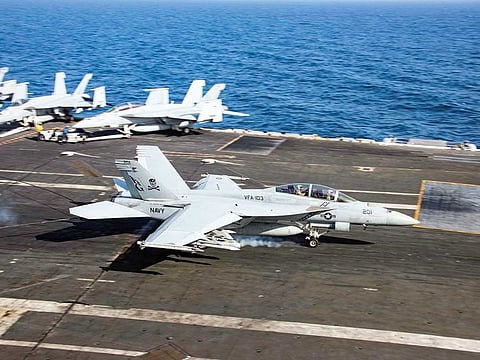Oman working to ease US-Iran tension
War could harm entire world if it breaks out, says Bin Alawi

Dubai: Oman’s Foreign Ministry said it was working to “ease the tensions” between Iran and the US.
The ministry in a series of tweets on Friday morning attributed the comments to Yousuf Bin Alawi, the sultanate’s minister of state for foreign affairs, and cited an interview in Asharq Al Awsat, the London-based newspaper owned by a Saudi media group long associated with the Al Saud royal family.
In the interview, Bin Alawi warns war “could harm the entire world if it breaks out.”
He doesn’t confirm any current Omani mediation but says both the US and Iran realise the gravity of the situation.
Oman’s Sultan Qaboos Bin Said spoke last week by telephone with US Secretary of State Mike Pompeo.
Oman, a nation on the eastern edge of the Arabian Peninsula, has long been an interlocutor of the West with Iran.
The US held secret talks in Oman with the Iranians that gave birth to the 2015 nuclear deal with world powers.
Tensions have ratcheted up recently in the Mideast as the White House earlier this month sent an aircraft carrier and B-52 bombers to the region over a still-unexplained threat it perceived from Iran.
The crisis takes root in the steady unraveling of the nuclear deal, intended to keep Iran from obtaining a nuclear weapon.
The accord promised economic incentives in exchange for restrictions on Tehran’s nuclear activities.
The Trump administration pulled America out of the deal last year, and subsequently re-imposed and escalated US sanctions on Tehran - sending Iran’s economy into freefall.
Khamenei’s criticism of Zarif signaled a hard-line tilt in how the Islamic Republic will react going forward amid President Donald Trump’s maximalist pressure campaign.
Iran declared earlier this month that the remaining signatories to the deal - Germany, France, Britain, China and Russia - have two months to develop a plan to shield Iran from American sanctions.
Also Read: Trump tweet threatens 'official end of Iran'
On Monday, Iran announced it had quadrupled its production capacity of low-enriched uranium, making it likely that Tehran will soon exceed the stockpile limitations set by the nuclear accord, which would escalate the situation further.
Several incidents have added to the crisis.
On Thursday, Saudi Arabia said Yemen’s Iran-backed militants again targeted an airport near its southern border with a bomb-carrying drone.
The Saudi military said it intercepted the drone, while the militant Houthis said it struck a Patriot missile battery at the airport. Al Houthis have claimed three times in recent days to have targeted the airport, which also hosts a military base. It comes after the Houthis last week targeted a Saudi oil pipeline in a coordinated drone attack.

_resources1_16a08522687_medium.jpg?w=320&auto=format%2Ccompress&fit=max)



![Oman’s Maritime Security Centre confirmed four crew members injured. [Illustrative image. ]](http://media.assettype.com/gulfnews%2F2026-03-01%2Fv5np7wj5%2FOil-tanker.jpg?w=320&auto=format%2Ccompress&fit=max)
